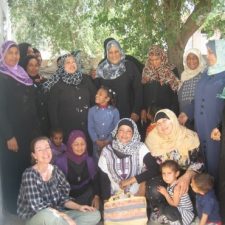
Dubai’s dream of exporting fresh camel milk to the rest of the world will soon become reality.
Green Prophet’s been doing alot of yakking about camels lately. Prepare to hear a lot more as the camel products go commercially global. Camel milk is a healthy alternative to cow milk; Camel milk is for good for diabetics. Camel milk’s been sold in supermarkets throughout the United Arab Emirates (UAE) for several years, and it may soon be approved for export to the European Union, but this means that the UAE’s two commercial dairy camel farms must quickly gear up to meet expected demand. Extracting camel milk is tricky business. These “ships of the desert” are rock-star temperamental.
“You have a ten-minute leeway,” says Dr. Peter Nagy, a senior vet at Al Nassma farm in Dubai, where about 2,500 camels provide milk for the Camelicious brand of milks, chocolates, cheese and ice-creams. Dr. Nagy told 7daysindubai, “Camels get agitated if you don’t follow the exact same routine every day. They like to know what is happening all the time.” Same could be said about me.
Camels typically produce six liters of milk a day during their calf-rearing cycle, which lasts about 550 days. Happy camels produce more milk, and they’re most content (and productive) if they get to spend time with their calves and enjoy free walkabouts (in controlled pens).
UAE’s camels are mostly bred for racing, not for milk production, and their milk yield is about a fourth of that of cows. Current milk production is insufficient to supply expected export markets. European demand is predicted to be high, but supplying wider demand within the Middle East is a also challenge. With an increasing number of people suffering lactose-intolerance, the worldwide market for camel milk is expanding. (Miriam’s report about improved blood sugar levels for diabetics who drink camel milk made waves through my Amman office: but none of us could find a Jordanian source for the creamy stuff.)
The USA’s Food and Drug Administration has also approved sale of camel milk, although milk will likely be sourced primarily through American camel ranches. That’s not to say that Middle Eastern ranchers couldn’t set up shop in America too.
Camel milk is more nutritious than cow’s milk, with healing properties increasingly verified by modern testing and trials. The high levels of insulin in camel’s milk and its antibodies, which are simpler in structure than human milk antibodies, enable it to penetrate deeper into the human tissue and cells, which means that the milk could be a major weapon against many human illnesses.
Although international studies have been performed with autism, diabetes, cancer, heart disease, Crohn’s Disease, Parkinson’s, food allergies and a variety of other illnesses, the American Camel Coalition wants to repeat those studies with pasteurized milk in medically supervised double-blind studies in US laboratories. Regardless of where the labs are located, positive outcomes will mean spiked demand in global markets.
Dubai’s Central Veterinary Research Laboratory is said to be considering importing hundreds of “milking” camels from Kazakhstan, from which it aims to breed generations of good milking camels. Dubai’s Camel Reproduction Centre has also managed to increase sixfold the rate of live camel births from surrogate mothers thanks to artificial insemination.
But other suppliers are working to meet predicted demand: Moroccan Vitamol Camel Dairy and Products already has EU approval to export camel milk to Europe from its headquarters in Tangiers. Milk from its herd of 2,200 camels is expected to be on sale in Europe in 2013, possibly beating the UAE to the marketplace. In the end it becomes a camel race after all.
Image of nursing camel from Shutterstock




i like the camel’s milk,it is very healthy up to berber’s stories in Morocco
I wonder what happens to all the baby camels bread so their mothers will milk?
Also, is the feed and care of all the extra camels sustainable? Milk-cow herding is very hard on the environment. What happens to all the mature camels past milking age, and the males? Is there a market for other camel products, like camel meat? Just wondering. Thanks for the great article!
Great questions, Van – which I forwarded to the camel ranch. Back to you when they reply – but I read the camels eat mostly vegetables (carrots are a favorite). Also check out recent stories on Green Prophet on camel meat, camel cloning, and camel milk as a promising treatment for diabetes.